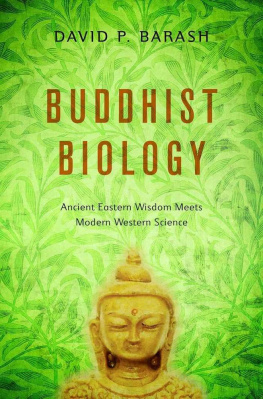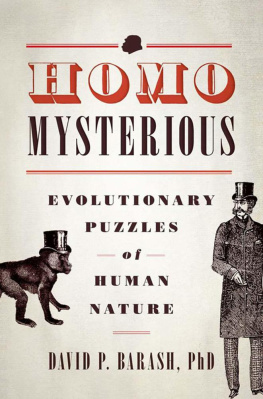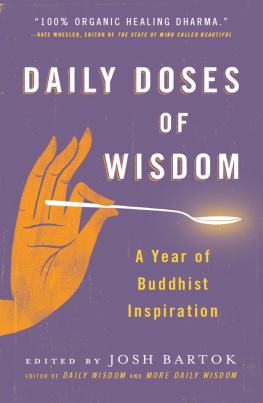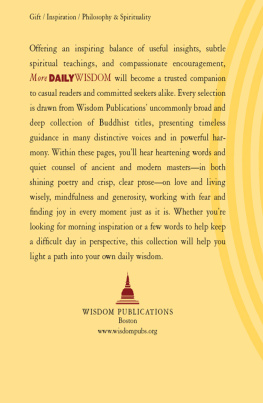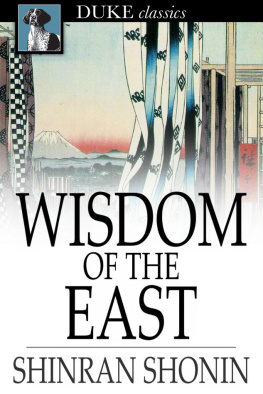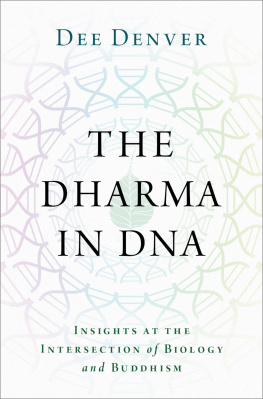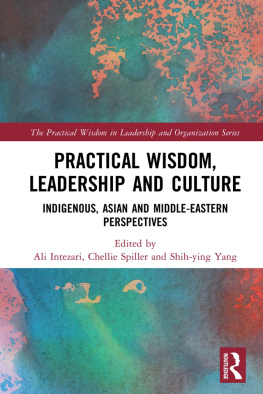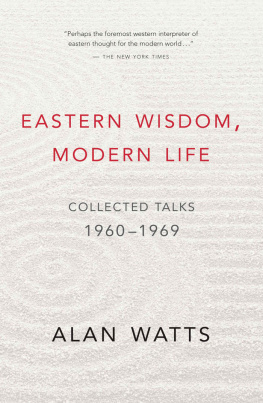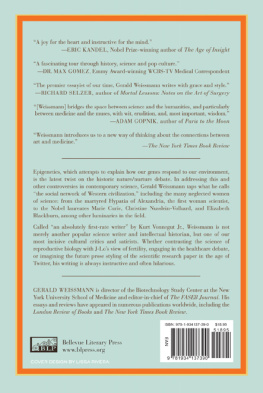Barash - Buddhist Biology: Ancient Eastern Wisdom Meets Modern Western Science
Here you can read online Barash - Buddhist Biology: Ancient Eastern Wisdom Meets Modern Western Science full text of the book (entire story) in english for free. Download pdf and epub, get meaning, cover and reviews about this ebook. City: Oxford, year: 2014, publisher: Oxford University Press, USA, genre: Religion. Description of the work, (preface) as well as reviews are available. Best literature library LitArk.com created for fans of good reading and offers a wide selection of genres:
Romance novel
Science fiction
Adventure
Detective
Science
History
Home and family
Prose
Art
Politics
Computer
Non-fiction
Religion
Business
Children
Humor
Choose a favorite category and find really read worthwhile books. Enjoy immersion in the world of imagination, feel the emotions of the characters or learn something new for yourself, make an fascinating discovery.
Buddhist Biology: Ancient Eastern Wisdom Meets Modern Western Science: summary, description and annotation
We offer to read an annotation, description, summary or preface (depends on what the author of the book "Buddhist Biology: Ancient Eastern Wisdom Meets Modern Western Science" wrote himself). If you haven't found the necessary information about the book — write in the comments, we will try to find it.
Barash: author's other books
Who wrote Buddhist Biology: Ancient Eastern Wisdom Meets Modern Western Science? Find out the surname, the name of the author of the book and a list of all author's works by series.
Buddhist Biology: Ancient Eastern Wisdom Meets Modern Western Science — read online for free the complete book (whole text) full work
Below is the text of the book, divided by pages. System saving the place of the last page read, allows you to conveniently read the book "Buddhist Biology: Ancient Eastern Wisdom Meets Modern Western Science" online for free, without having to search again every time where you left off. Put a bookmark, and you can go to the page where you finished reading at any time.
Font size:
Interval:
Bookmark:
BUDDHIST BIOLOGY
ANCIENT EASTERN WISDOM MEETS MODERN
WESTERN SCIENCE
David P. Barash


Oxford University Press is a department of the University of Oxford.
It furthers the Universitys objective of excellence in research, scholarship,
and education by publishing worldwide.
Oxford New York
Auckland Cape Town Dar es Salaam Hong Kong Karachi
Kuala Lumpur Madrid Melbourne Mexico City Nairobi
New Delhi Shanghai Taipei Toronto
With offices in
Argentina Austria Brazil Chile Czech Republic France Greece
Guatemala Hungary Italy Japan Poland Portugal Singapore
South Korea Switzerland Thailand Turkey Ukraine Vietnam
Oxford is a registered trademark of Oxford University Press
in the UK and certain other countries.
Published in the United States of America by
Oxford University Press
198 Madison Avenue, New York, NY 10016
Oxford University Press 2014
All rights reserved. No part of this publication may be reproduced, stored in a retrieval system, or transmitted, in any form or by any means, without the prior permission in writing of Oxford University Press, or as expressly permitted by law, by license, or under terms agreed with the appropriate reproduction rights organization. Inquiries concerning reproduction outside the scope of the above should be sent to the Rights Department, Oxford University Press, at the address above.
You must not circulate this work in any other form
and you must impose this same condition on any acquirer.
Library of Congress Cataloging-in-Publication Data
Barash, David P.
Buddhist biology : ancient Eastern wisdom meets modern Western science / David P. Barash.
pages cm
ISBN 9780199985562 (alk. paper)
1. BiologyPhilosophy. 2. BiologyReligious aspects. 3. Buddhism and science. 4. Philosophy and
science. I. Title.
QH331.B244 2013
570.1dc23
2013007312
9 8 7 6 5 4 3 2 1
Printed in the United States of America
on acid-free paper
To Noa Bogaisky
If we had a keen vision and feeling for all that is ordinary in life, it would be like hearing the grass grow or the squirrels heart beat, and we should die of that roar which lies on the other side of silence.
George Eliot
ContentsTHERE ARE SO many people (and more than a few animals) who contributed in various ways to this booknot just the writing, but even more, its conceptual foundationsthat Im tempted to thank everyone by thanking no one. Thus, my gratitude is literally unending to a panoply of biologists, Buddhists, philosophers, naturalists, students, and teachers, some long gone and others still flourishing. Special appreciation, however, goes to my agent, Howard Morhaim; to Jeremy Lewis, acquisitions editor at Oxford University Press as well as to eagle-eyed yet light-fingered copy editor, Barbara Norton; and to Tom Kusel, Aditya Ganapathiraju, and James Woelfel, plus a hard-working group of beta-test readers from my Psychology 480 (Ideas of Human Nature) class at the University of Washington. Much of this book was written while on two sabbatical leaves in Costa Rica, for which I thank the Department of Psychology and administration of the University of Washington.
I also wish to note that several different paragraphs, scattered throughout this book, appeared earlier in various essays of mine that were published in The Chronicle of Higher Education Review. I am grateful to The Chronicle for permission to reprint this material. Similarly, selections from a piece titled Only Connect, and posted in aeon magazine (www.aeonmagazine.com) on Nov. 5, 2012, are incorporated into the present book; I appreciate the kindness of aeons editors in permitting its republication.
BUDDHIST BIOLOGY
A Science Sutra
EARLY IN SHAKESPEARES play The Tempest, a clown named Trinculo takes shelter from the storm in a most unappealing place: under the monster, Caliban, explaining that misery acquaints a man with strange bed-fellows. This phrase has since morphed into politics makes strange bedfellows. But in fact, there have been many strange bedfellows, not all of them resulting from misery or involving politics.
Prominent among these odd couples is the pairing of religion and science. Which is the clown and which the monster? Maybe both, or neither. Or maybe a bit of each, depending on circumstances. The new atheists (notably Richard Dawkins, Daniel Dennett, Christopher Hitchens, and Sam Harris) have claimed that religion and science are not just separate but downright antagonistic. The late Stephen Jay Gould, by contrast, made a case that science and religion (Trinculo and Caliban) are actually compatible because they constitute what he called NOMANon-Overlapping Magesteria. For Gould, science explains how things are, while religion deals with why; that is, science is largely concerned with the facts of the world, whereas religion deals with issues of ultimate meaning and ethics. Accordingly, the two are and should be of equal but independent status.
This accommodationist position is appealing, especially since it opens the door to peaceful coexistence between these two key human enterprises. (I will here shroud till the dregs of the storm be past, concludes Trinculo.) But wishing doesnt make things so, nor does it cause storms to cease. In my opinion, science and religion are often in conflict, not so much because science makes claims about meaning or ethics (although that has happened on occasion), but because religion keeps making assertions about the real world that not only overlap those of science, but are frequently contradicted by them. Consider, for example, the Jewish story about Moses parting the Red Sea and speaking with God in the form of a burning bush; the Christian beliefs that Jesus was born of a virgin, walked on water, raised the dead, and was himself resurrected; or the Muslim insistence that Muhammad took dictation from Allah via the angel Gabriel, and that ten years after becoming a prophet, he traveled to the Seventh Heaven on the back of the buraq, a white winged steed with a human face as well as an extra set of wings, and whose every stride extended to the farthest point that it could see.
There is, however, an intriguing exception to what I, at least, see as the conflict between science and religion: Buddhism. Perhaps this is because Buddhism is as much a philosophy as a religion, or maybe because Buddhism is somehow more valid than, say, the big Abrahamic three (Judaism, Christianity, and Islam). In any event, when it comes to Buddhism and scienceespecially the science with which I am most familiar, namely biologywe can replace NOMA with POMA: Productively Overlapping Magisteria. Buddhism is a religionor, rather, a spiritual and philosophical practice traditionwhereas biology is science. Buddhism is mostly Eastern, at least in its origin; biology is comparably Western. And yet, Kipling was wrong: the twain have met. And not only that, but to a large extent, they get along just fine. Strange bedfellows indeed, yet oddly compatibleat least on occasion, and within limits.
Religion may well be advised to steer clear of factual material, and science, similarly, to avoid deriving ought from is, but the painful truth is that the two have often intersected, with each making truth claims that impinge upon the other. And when this has happened, religion has had to retreat reluctantly, to be sure, and in most cases only after having done much harm to our species-wide search for truth (not to mention bodily harm to many of those pursuing this search). But eventually, religion has given way. The two greatest such fallbacks have involved the geocentric universe, replaced in due course (although not without much gnashing of theological teeth and burning of heretics) by heliocentric reality as described by Nicolaus Copernicus, Johannes Kepler, Galileo Galilei, and Isaac Newton; and the question of special creation as presented in the Judeo-Christian Bible versus evolution, as described by Charles Darwin and supported by decades of modern biological science.
Next pageFont size:
Interval:
Bookmark:
Similar books «Buddhist Biology: Ancient Eastern Wisdom Meets Modern Western Science»
Look at similar books to Buddhist Biology: Ancient Eastern Wisdom Meets Modern Western Science. We have selected literature similar in name and meaning in the hope of providing readers with more options to find new, interesting, not yet read works.
Discussion, reviews of the book Buddhist Biology: Ancient Eastern Wisdom Meets Modern Western Science and just readers' own opinions. Leave your comments, write what you think about the work, its meaning or the main characters. Specify what exactly you liked and what you didn't like, and why you think so.

